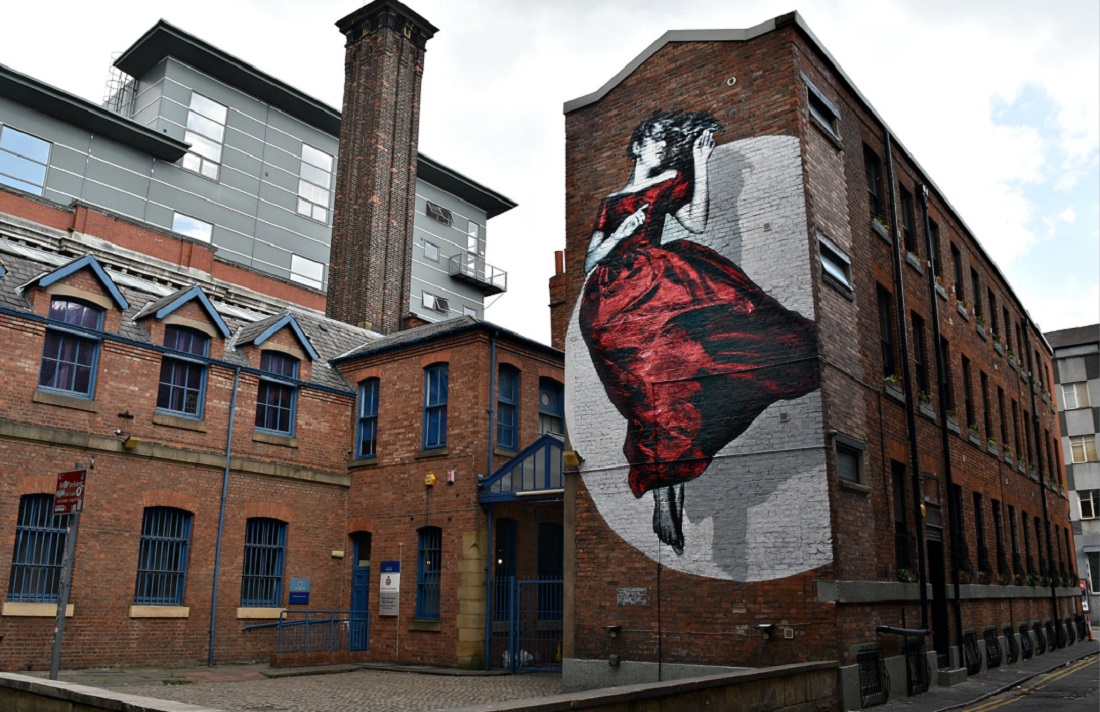
Serenity by SNIK, a Manchester street art piece
Photo: Loco Steve
Manchester seeks £71.8m to ‘safeguard and stimulate’ culture
Efforts by Manchester and the West Midlands to secure extra money highlight fears that rescue funding will be directed towards London.
Manchester needs an extra £71.8m to “repair, restart and rethink” the city’s cultural life over the next two years, the city council says.
Letters from to Culture Secretary Oliver Dowden in recent weeks warn that Manchester City Council, which faces its own financial deficit due to the coronavirus, cannot save local organisations like the Royal Exchange Theatre that are now consulting on redundancies.
“Without financial support, I am concerned that not that not many companies will make it to Stage 5 of your inadequate recovery plan for the performing arts sector,” Luthfur Rahman, Executive Member for Culture, Leisure and Skills, wrote.
Rahman said efforts to safeguard the arts via the Coronavirus Job Retention Scheme, Arts Council England’s emergency response fund and a £1.57bn rescue package were appreciated but insufficient.
READ MORE:
- ACE grants just one third of emergency funds, holds on to £56m
- Unprecedented £1.57bn package to brings arts back from the brink
“I have to ask, what was the point of that investment if it still comes to job losses for those sectors that will be the last to re-open?
"It will not be enough simply to keep cultural organisations from bankruptcy – that will do nothing to future-proof either the sector itself, or the wider local economy and whole livelihoods, that depend on a thriving cultural scene.
"Culture is no under-study or bit-part player here in Manchester. It has always been a leading light, the real deal for us, and an intrinsic part of the city's success. We need culture – and we now need urgent reassurances that the necessary cash is coming, so that we can have it back again.”
Cultural Recovery Plan
The £71.8m figure, calculated following discussions between city leaders and cultural organisations, would allow some to return to normal business and others to innovate “a new kind of normal for the future”.
The city’s cultural recovery plan includes a timeline for the phased relaxation of social distancing in galleries and museums between August and December, noting a need to “be realistic [that] the sector will be one of the last out of a devastating lockdown”.
A programme of work that can respond to changing health and economic circumstances would be pursued until the end of the year, culminating in ‘Unlock’, an eight-month cultural programme with Manchester International Festival 2021 at its centre.
Rahman told ArtsProfessional that he hopes the £1.57bn culture rescue package will support Manchester’s goals, although he was frustrated not to have received any response from Dowden.
“Before the lockdown, this [culture] was one of the fastest growing sectors and biggest employers in the city. If we can’t get that back it’s going to have a massive impact.
“The tourism industry depends on having a robust offer here; the hospitality offer depends on having culture and activities to do in the city,” he said.
Manchester’s arts and cultural organisations draw in 4.3m people and £137m in economic value, according to Rahman’s correspondence.
“These challenging times are certainly a threat to this ecology, as you suggest they also are for the capital,” he wrote.
Second to London
The letters to Dowden note that Manchester is the second most-visited city in England after London and that its continued economic success is “inextricably tied” to its cultural offer.
But Manchester is not alone in claiming its economic clout: West Midlands Combined Authority (WMCA) is asking the Government for a £3.2bn stimulus package, £80m of which would be ringfenced for creative and cultural purposes.
This funding would allow the cultural sector to adapt business models, accelerate digitisation and “reopen at pace”. £50m would be used on “shovel ready” projects for arts venues across the region: “This will reposition the region as a global destination and innovative leader in cultural offers and creative practice,” according to a recently released economic blueprint.
The authority says the region is the largest economy outside of London and “could be hit harder than most by the Covid-19 lockdown”.
“This plan will not only address the short-term risks of Covid-19 by creating and safeguarding jobs, but also takes into account the longer-term improvements in regional innovation, competitiveness and resilience. We have already leveraged substantial investments for our proposals from both private and public sector partners,” WMCA said.
“This isn’t a plan just for now, or even the next five years, but will recharge our economy for long term growth.”
Rahman said “this is not a competition between the West Midlands and Greater Manchester” for more culture funding.
“I think we have made the case … that the investment has to be more equitably divided across the country.”
Join the Discussion
You must be logged in to post a comment.